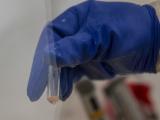Editor's note: A correction was made in this story Nov 9 to make clear that the licensed anthrax vaccine does not contain the recombinant form of anthrax protective antigen.
Nov 8, 2004 (CIDRAP News) – The Department of Health and Human Service (HHS) said last week that it plans to buy up to 5 million doses of the controversial anthrax vaccine currently used by the US military and put it in the national stockpile for civilian use.
HHS posted a Web site notice of its intention to buy the vaccine Nov 4, the same day it announced the award of an $877 million contract for 75 million doses of a new and as-yet-unlicensed anthrax vaccine for the civilian stockpile.
The HHS notice said the department "intends to negotiate a sole source procurement with BioPort Corporation," Lansing, Mich., the only manufacturer of the licensed vaccine used by the Department of Defense (DoD). The goal is to get the vaccine into the Strategic National Stockpile, an emergency supply of drugs and medical products, within 24 months of the contract award.
More than 1.25 million US military personnel have received BioPort's licensed vaccine, called BioThrax (also called anthrax vaccine adsorbed), since 1998. But DoD suspended the vaccination program Oct 27, after a federal judge ruled that the Food and Drug Administration (FDA) had not followed proper procedures in approving the vaccine for inhalational anthrax.
The court ruling came in a lawsuit brought by six military members and military contractor employees. Hundreds of service members have resisted the vaccination because of concern about side effects, and some have been forced out of the military or otherwise disciplined as a result.
Full protection with BioThrax requires six doses over 18 months, followed by annual boosters. The new vaccine, which is being made by VaxGen of Brisbane, Calif., is intended to provide full protection with three doses.
VaxGen's vaccine, called rPA102, is made from a purified form of recombinant protective antigen (rPA), one of the components of the toxin produced by anthrax. The licensed vaccine contains protective antigen obtained from anthrax organisms, rather than a recombinant form of the protein, HHS officials have said. The hope is that rPA102 will cause fewer side effects than the current vaccine.
The prestigious Institute of Medicine (IOM) carefully evaluated BioThrax in 2002 and concluded that it was "acceptably safe," but also called for development of a new vaccine requiring fewer doses and causing fewer reactions. The IOM said an improved vaccine was "urgently needed."
HHS officials could not be reached today for further details on the plan to buy vaccine. But an HHS spokesman quoted in a Nov 5 report by Govexec.com said the department intends to buy BioThrax for civilian use because it is currently the only anthrax vaccine available.
In a Nov 4 statement welcoming the HHS announcement, BioPort's chief executive officer, Bob Kramer, said, "We are prepared to supply millions of doses of BioThrax to assist with the nation's preparedness efforts and provide balance to the stockpile by adding a proven vaccine alongside an experimental product."
Kramer also said the national stockpile for biodefense should include products from multiple suppliers, "due to performance risks associated with any single product or single manufacturer."
Funds for buying both BioThrax and VaxGen's vaccine are to be provided under the Project Bioshield Act, according to HHS. The act authorizes spending up to $5.6 billion to encourage the production of medical countermeasures for chemical, biological, radiological, and nuclear weapons.
In the Oct 27 court ruling, US District Judge Emmet G. Sullivan of Washington, DC, said DoD cannot legally require military personnel to receive anthrax shots unless the president issues an emergency order to that effect. Sullivan concluded that the FDA had failed to allow meaningful public comment when it approved the vaccine specifically for use against inhalational anthrax, as distinguished from cutaneous anthrax.
In response to the ruling, DoD suspended the vaccination program but insisted that it complies with legal requirements and that the vaccine is safe.
See also:
DoD's Anthrax Vaccine Immunization Program
http://www.anthrax.osd.mil/
Nov 4 CIDRAP News story, "HHS to spend $877 million on new anthrax vaccine"
Oct 28 CIDRAP News story, "Court ruling again stops anthrax shots for US soldiers"



















